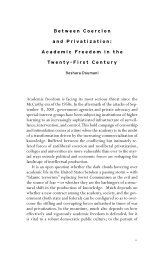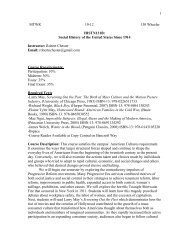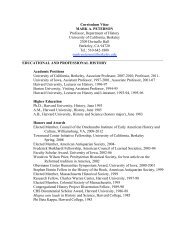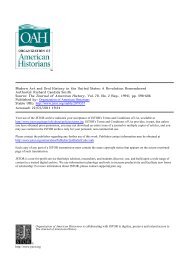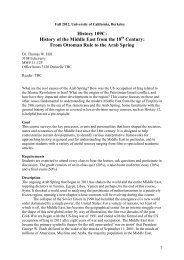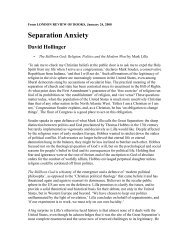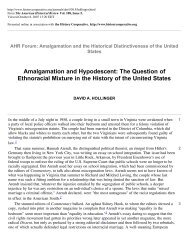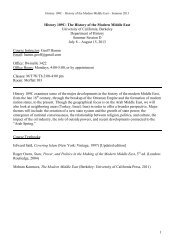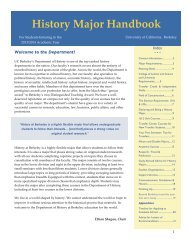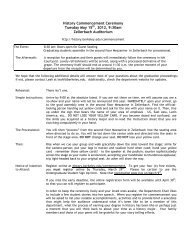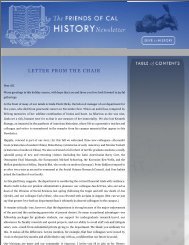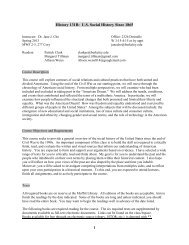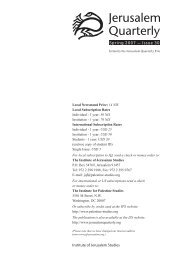Program Guide in PDF Format - Department of History, UC Berkeley
Program Guide in PDF Format - Department of History, UC Berkeley
Program Guide in PDF Format - Department of History, UC Berkeley
- No tags were found...
Create successful ePaper yourself
Turn your PDF publications into a flip-book with our unique Google optimized e-Paper software.
and coursework must be fulfilled and all <strong>in</strong>completes removed before tak<strong>in</strong>g the exam<strong>in</strong>ation. In plann<strong>in</strong>g for theirqualify<strong>in</strong>g exam, students should consult with their proposed committee members to make certa<strong>in</strong> they will be availableto participate. Students should notify the Graduate Assistant by complet<strong>in</strong>g the departmental form “Constitution <strong>of</strong> thePhD Oral Qualify<strong>in</strong>g Exam Committee.” This form should be submitted at least two months <strong>in</strong> advance <strong>of</strong> the proposedexam<strong>in</strong>ation date; exceptions to this require the approval <strong>of</strong> the Graduate Advisors Committee. There is an additionalGraduate Division form, the “Application for the Qualify<strong>in</strong>g Exam<strong>in</strong>ation,” that must be submitted to Graduate Division atleast three weeks <strong>in</strong> advance <strong>of</strong> the orals date. There are no exceptions to the Graduate Division deadl<strong>in</strong>e. This meansthat any petition for an exception to the committee composition must be approved before the application can be sentto Graduate Division.The exam committee is composed <strong>of</strong> two history faculty members who will exam<strong>in</strong>e <strong>in</strong> the first field, two history facultymembers who will exam<strong>in</strong>e <strong>in</strong> the second field, and a faculty member from another department who will exam<strong>in</strong>e <strong>in</strong>the outside field. A first field pr<strong>of</strong>essor who is not the student’s proposed dissertation advisor will normally chair thecommittee. The chair and outside member must be members <strong>of</strong> the <strong>Berkeley</strong> Division <strong>of</strong> the Academic Senate (tenuredor tenure-track faculty). Please be sure to check that these two pr<strong>of</strong>essors meet this requirement. The GAC and theDean <strong>of</strong> the Graduate Division must formally approve the composition <strong>of</strong> the exam committee.The exam tests the candidate’s mastery <strong>of</strong> the factual <strong>in</strong>formation and theoretical concepts absorbed through courseworkand sem<strong>in</strong>ar research <strong>in</strong> the three fields approved for the doctoral program. It also assesses the candidate’s read<strong>in</strong>essto enter the dissertation research phase <strong>of</strong> the program.The exam is oral and lasts between two and three hours. As a general rule, each exam<strong>in</strong>er has twenty m<strong>in</strong>utes to askquestions. A shorter follow-up round is possible after each exam<strong>in</strong>er has had his/her twenty m<strong>in</strong>utes. The oral exammay also, at the student’s option, have a written component. Two weeks prior to the oral exam, students who choosethe written option will be <strong>of</strong>fered three topics <strong>in</strong> each <strong>of</strong> the two history fields. The candidate will select one topic <strong>in</strong>each field as the subject <strong>of</strong> an essay <strong>of</strong> the approximate scope <strong>of</strong> an upper-division undergraduate lecture and will begiven a week to write the essays, us<strong>in</strong>g any reference material or other resources desired. The exam committee will thenread the two essays and, as part <strong>of</strong> the oral exam, ask the candidate to discuss and defend the ideas presented there<strong>in</strong>.This written component is an <strong>in</strong>tegral part <strong>of</strong> the PhD exam<strong>in</strong>ation and not a separate test to be passed or failed alone.Students who choose this option must consult with their faculty advisor and exam<strong>in</strong>ers <strong>in</strong> the two history fields and then<strong>in</strong>form the Graduate Assistant no later than five weeks prior to the date <strong>of</strong> the oral exam. A copy <strong>of</strong> each essay will beplaced <strong>in</strong> the student’s folder at the time <strong>of</strong> the PhD exam.OutcomesAt the conclusion <strong>of</strong> the PhD oral qualify<strong>in</strong>g exam, the committee may advise the Dean <strong>of</strong> the Graduate Division thatthe student has either a) passed the exam and should be cont<strong>in</strong>ued <strong>in</strong> the program, b) failed the exam but should bere-exam<strong>in</strong>ed after at least three months have passed, or c) failed the exam and should be discont<strong>in</strong>ued without reexam<strong>in</strong>ation.Registration for Directed Dissertation ResearchAfter pass<strong>in</strong>g the PhD oral qualify<strong>in</strong>g exam<strong>in</strong>ation, unless they are on approved withdrawal status, students register for<strong>History</strong> 296: Directed Dissertation Research until the dissertation is completed and filed with the Graduate Division.Advanc<strong>in</strong>g to PhD candidacyIn order to advance to PhD candidacy, the student must a) pass the qualify<strong>in</strong>g exam, b) obta<strong>in</strong> approval from theGraduate Advisors Committee for the composition <strong>of</strong> their dissertation committee (consist<strong>in</strong>g <strong>of</strong> two members fromthe history department and one member from another department), and c) present the dissertation committee awritten dissertation prospectus. After the committee has met with the student and approved the prospectus, thestudent will submit the “Application for Candidacy for the Doctoral Degree” form to the Graduate Division for formalapproval.Human subjects and animal protocol: If your research project <strong>in</strong>volves human subjects (<strong>in</strong>clud<strong>in</strong>g <strong>in</strong>terviews), you musttake the onl<strong>in</strong>e Collaborative IRB Tra<strong>in</strong><strong>in</strong>g Initiative (CITI) course and pr<strong>in</strong>t out the certification <strong>of</strong> completion before youcan submit the paperwork to advance. If your project <strong>in</strong>volves vertebrate animals, you must obta<strong>in</strong> prior approval fromthe Animal Use and Care Committee and the Graduate Division.— 10 —



